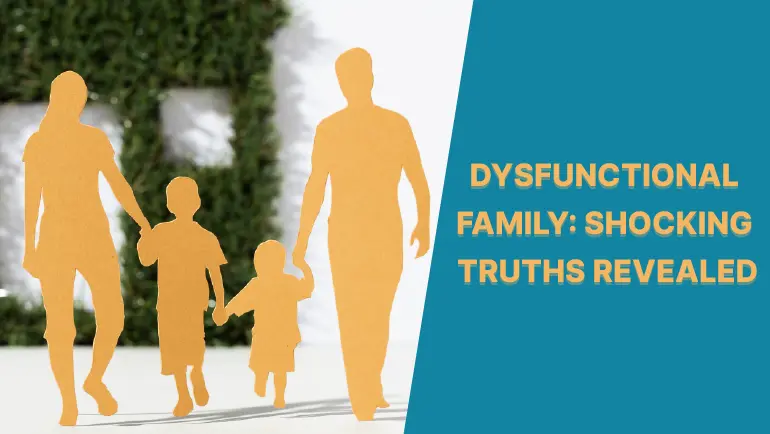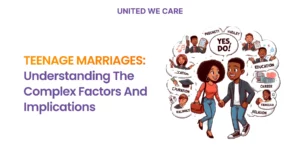Introduction
Family is the most important part of our lives. But, have you ever felt that your family environment is not healthy? Do you and your family members have fights frequently, abuse each other, or are never able to find solutions to issues at hand? Then you, my friend, are living with a dysfunctional family. Such a family can drastically impact your entire life. In this article, let me help you understand such family dynamics, how they can impact you, and what you can do to overcome the issues that come up from being with a dysfunctional family.
“The bond that links your true family is not one of blood, but of respect and joy in each other’s life.” -Richard Bach [1]
What Does a Dysfunctional Family Mean?
We all need family members around us. But, every family can have some issues or the other. A dysfunctional family is one where whenever you and your family try to communicate, it ends up in an argument or a fight. That way, there is no way you all can function and grow as a unit. There can be neglect, emotional and physical abuse, alcohol or drug overuse, or a general inability to solve issues without fighting [2].
My first introduction to an unhealthy family situation, like most of us, was through storybooks. Cinderella, Matilda, and Rapunzel are all examples of unhealthy or dysfunctional families. In fact, being a huge movie and TV show buff, I have watched a lot of movies and shows where families did not show a very healthy environment. One of my favorite shows about dysfunctional families is ‘Modern Family.’ A family with a lot of ups and downs but with very little emotional support and no respect for boundaries whatsoever.
How Does a Dysfunctional Family Affect the Family Members?
When you come from a dysfunctional family, everyone in the family gets impacted in a number of ways [3]:
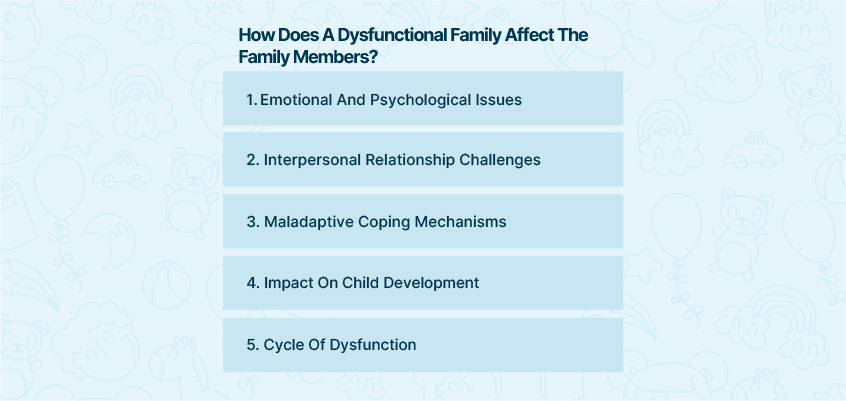
- Emotional and Psychological Issues: If you have grown up in a dysfunctional family, then you might have issues dealing with your emotions. You and your family members might be more prone to anxiety and depression. You all might even face shame and guilt. In fact, these can lead to self-worth issues.
- Interpersonal Relationship Challenges: Coming from a dysfunctional family, you might find it difficult to build and maintain relationships. You might struggle with trust issues and have difficulty setting boundaries. You might even face communication issues, specifically during conflicts. That way, you may not be able to reach a middle ground during fights.
- Maladaptive Coping Mechanisms: An unhealthy family situation can teach you coping techniques that further cause you harm. You might turn to alcohol or drugs to fill the feelings of emptiness. These coping techniques can lead to you indulging in self-harm or extreme adventure sports where you risk your life.
- Impact on Child Development: As a child, you might have faced issues in your emotional and psychological development. You might not be able to control and manage your emotions. This can even impact your performance in academics and how you talk to people around you.
- Cycle of Dysfunction: Did you know that the way you saw your family while growing up, you could demonstrate the same to your future relationships and families? This cycle can continue generation after generation.
What are the Causes of Families Becoming Dysfunctional?
There is a lot that takes for a family to become dysfunctional. Here’s what can be the possible causes [4]:
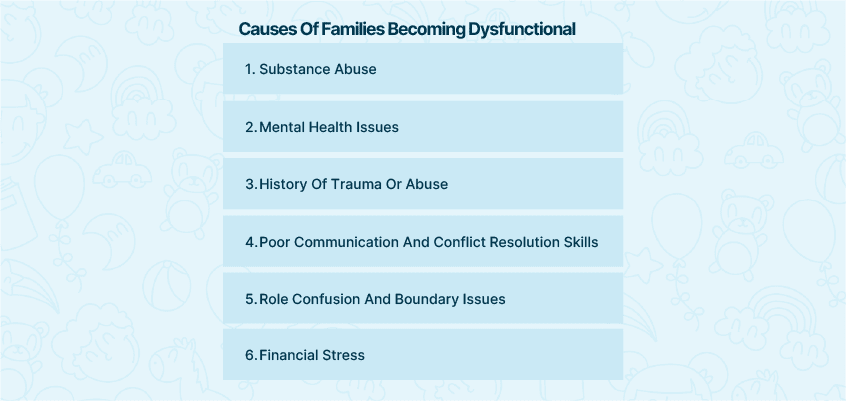
- Substance Abuse: You might have had family members who had alcohol and/or drug addiction. Usually, when a person becomes addicted to these substances, they pick up verbal, emotional, or physical fights with other family members. This can hamper the functioning of the entire family.
- Mental Health Issues: If you come from a family history of anxiety, depression, or personality disorders. Having seen their emotional ups and downs, you and your family might have gotten impacted negatively. It can even cause communication issues when you try to talk to the other members or to other people outside of the family.
- History of Trauma or Abuse: Your family might have seen events that caused trauma or abuse. It could be domestic violence, childhood abuse, or neglect. If this is left unresolved, it can lead to constant and ongoing dysfunction in your family.
- Poor Communication and Conflict Resolution Skills: Your family members might never have learned how to communicate with each other in a healthy manner. That way, any time there is an issue that comes up, it always ends up in arguments and fights. That can lead to misunderstandings and resentment. A small issue can turn into a big problem rather than finding a possible solution within the family.
- Role Confusion and Boundary Issues: You and your family might never be able to define roles and boundaries in the family. One member can feel that the other will take care of something, and vice versa. For example, the husband was to pick up the kids, but he thought that it was the wife who has to pick up the kids. When these roles and boundaries are unclear or violated, it can lead to confusion and power struggles. That way, you can face difficulties in building and maintaining healthy relationships.
- Financial Stress: If your family is going through some financial issues, then it’s possible for the family to become unstable and unhealthy. Poverty and financial strain can cause a lot of tension. So, if one member of your family causes further loss of money, there can be huge fights and even physical abuse.
How to Overcome Issues in a Dysfunctional Family?
As difficult as it may seem to overcome the challenges of a dysfunctional family, here’s what you can do to help yourself and other members of the family [5]:
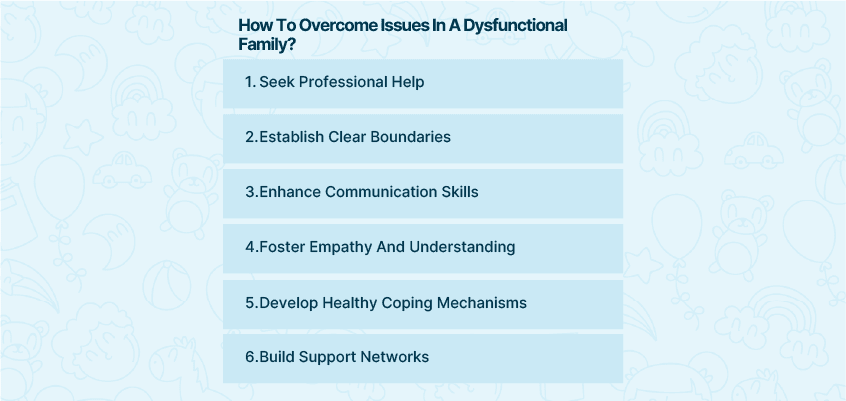
- Seek Professional Help: When there are professionals available, then why do you want to handle everything on your own? Go for family counseling or therapy! Your therapist can help you both understand the deep issues in a much better manner. Sometimes when we are not able to put everything in the right words, we can take help from a third person. That way, you can improve your communication, and develop healthier coping strategies. United We Care is one such platform that can help you.
- Establish Clear Boundaries: Talk to people, I cannot emphasize this more. Talk to your loved ones and set clear boundaries about what works and does not work for you in terms of security and anxiety. You can help other family members set their boundaries. You just have to respect those boundaries. That way, you all can have clear roles in the family and get your personal space as well.
- Enhance Communication Skills: You can learn how to communicate with your loved ones. That includes not just learning what to say or how to say it but also being an active listener. That way, you can talk with empathy and understanding. The better your communication skills, the easier it will be for you to reach solutions whenever there is an issue that occurs.
- Foster Empathy and Understanding: You can ask your family to listen to each other so that you can find solutions and just to counter what is being said. That way, not only will you all learn to be empathetic with each other, but you will also be able to break the cycle of dysfunctionality. You all can, then, have healthy and beautiful relationships.
- Develop Healthy Coping Mechanisms: We are all work-in-progress. Give yourself the time and space to work on your issues. Through healthy coping skills, such as self-compassion-building exercises, you can become more aware of yourself. For this, you can even use mindfulness techniques that can reduce anxiety and impulsive reactions with your family members.
- Build Support Networks: When everything else seems to be crashing around you, you can find help and support from your support system of friends, relatives, support groups, or mentors. Discuss with them what you are going through, and if they have gone through issues with their family members, then ask what helped them.
Conclusion
Family is the most important component of our lives. But, if the family only starts adding to the issues, then it can become difficult to cope. Your family might not know how to communicate, they might be abusive and neglectful, or even use substances like alcohol and drugs. These all can cause emotional, mental, and physical issues to arise in your and other family members’ lives. It’s important to learn how to cope in a better manner. The idea, first of all, is to become aware of these issues and how they are impacting you. Then, you can learn how to communicate without fighting, get help from an expert, and give each other space to grow and overcome all the challenges. Time heals everything. If not, then at least you will learn what needs to be done. Just give yourself and your family the time to do that.
If you live in a dysfunctional family, contact our expert family counselors or explore more content at United We Care! At United We Care, a team of wellness and mental health experts will guide you with the best methods for well-being.
References
[1] R. Bach, Illusions: The Adventures of a Reluctant Messiah. Delacorte Press , 2012. [Online]. Available: https://www.goodreads.com/en/book/show/29946
[2] J. Hunt, Dysfunctional Family: Making Peace with Your Past. Aspire Press, 2014.
[3] R. D. Reichard, “Dysfunctional Families in Dysfunctional Systems?,” Journal of Child Sexual Abuse, vol. 2, no. 4, pp. 103–109, Jan. 1994, doi: 10.1300/j070v02n04_09.
[4] Olson, David H. L., DeFrain, John D., and Skogrand, Linda, MARRIAGE AND FAMILIES: INTIMACY, DIVERSITY, AND STRENGTHS, NINTH EDITION. McGraw-Hill Education, 2019.
[5] J. L. Lebow, A. L. Chambers, A. Christensen, and S. M. Johnson, “Research on the Treatment of Couple Distress,” Journal of Marital and Family Therapy, vol. 38, no. 1, pp. 145–168, Sep. 2011, doi: 10.1111/j.1752-0606.2011.00249.x.


